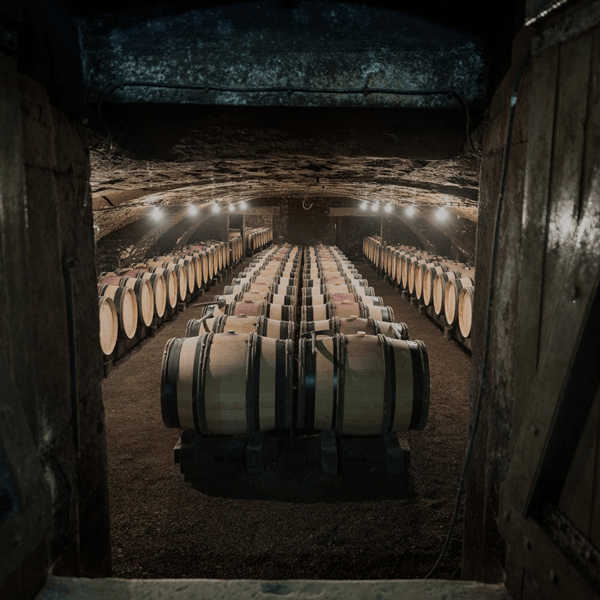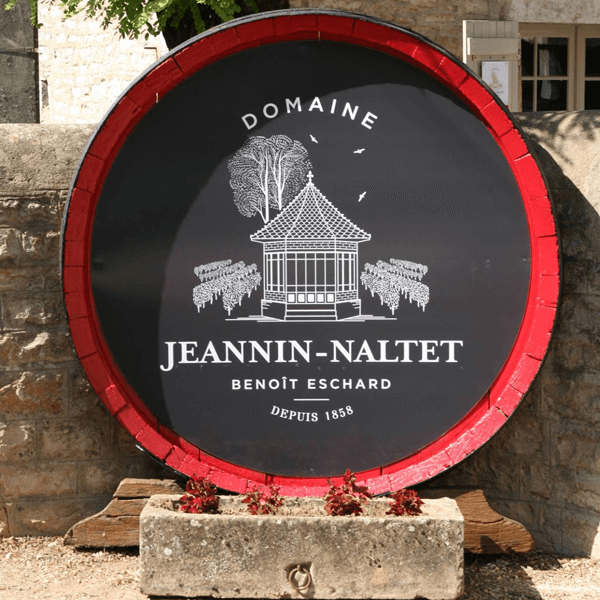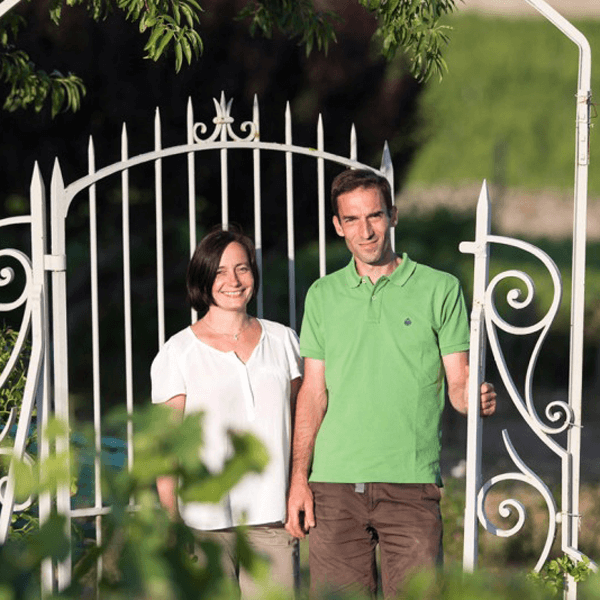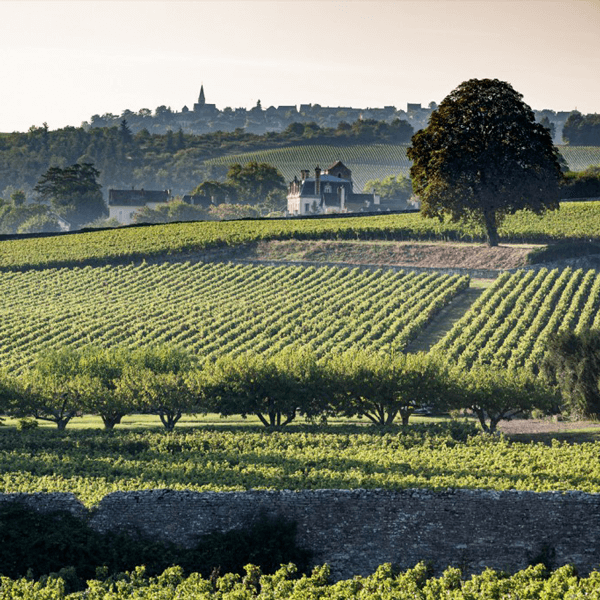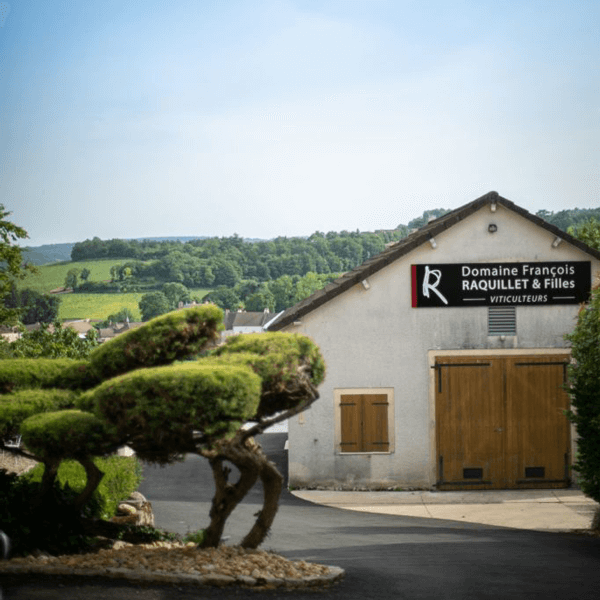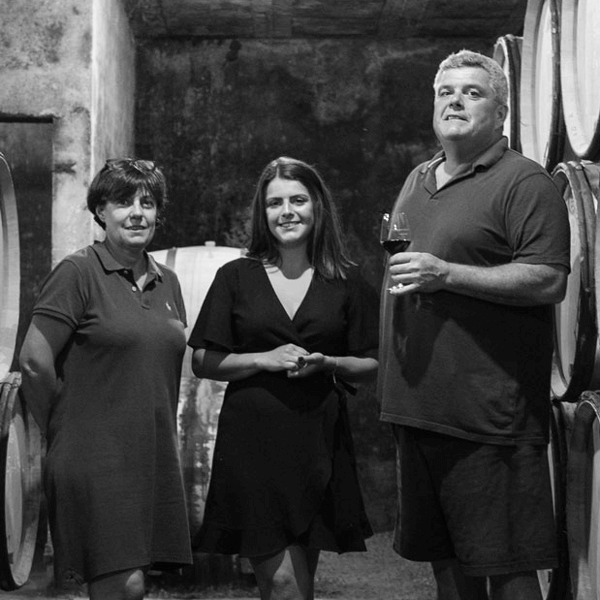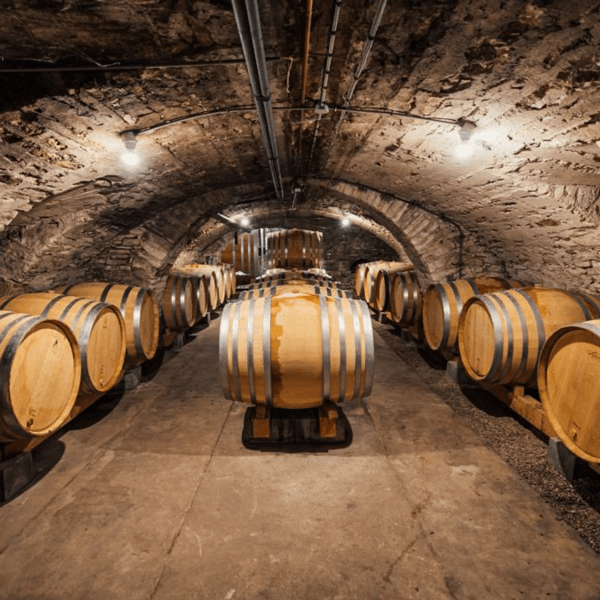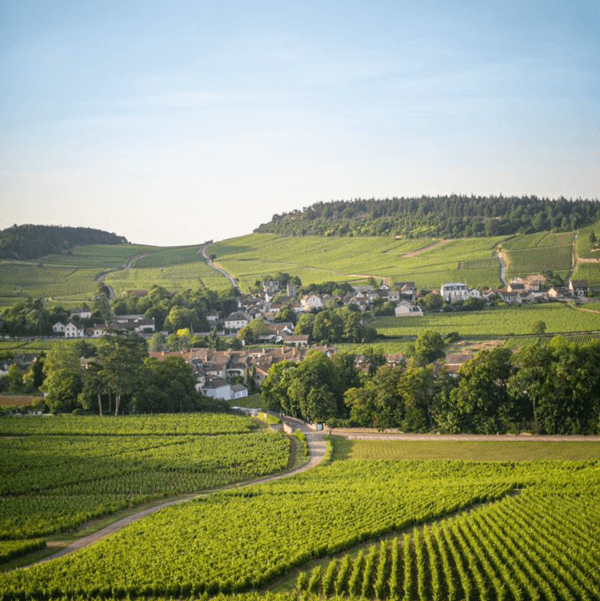Chalonnais
In 2023, producers were thrilled by the volume and quality they were able to produce in the Côte Chalonnaise, with Pierre Jacqueson wishing that ‘every vintage could be like this’. Most of the wines we tasted were very well balanced and really spoke of their terroir. Both the whites and reds are generous with good levels of ripe fruit, tannins and acidity and most should be approachable within a few years. The 1er Crus will benefit from time in the cellar. Five years minimum should do the trick.
Please note that some of the web pages may take a few moments to load.

Domaine Ninot
Domaine Ninot has 13 hectares split 50/50 between Pinot Noir and Chardonnay, with Rully and Rully 1er Cru in white and red, and 2 hectares of red Mercurey. They have been working organically since 2017, and the first vintage to be certified organic was 2020.
The domaine is run by Erell, who is in charge of the cellar and the commercial side, and her brother Flavien in the vineyard. The family has had roots in the region since the 14th century, and Erell and Flavien's grandfather was one of the leaders of the appellation of Rully when it was established in 1939. However he died when their father Pierre-Marie was only 14, and the domaine, split between five children, had to be sold. Pierre-Marie kept his part of the inheritance, 5 hectares of vines, and began again, gradually adding to the holdings by fermages and purchases. Once Erell had completed her studies in oenology and commerce, and had gained experience by working abroad, he handed over the keys to the cellar.
Once again Erell was in fine form when we visited in October. She explains 2023 was a rare joy to work. The season looked after itself really, with no major threats and the vinification went very smoothly. 'In the cellar we had very little todo this year..'. She is delighted to have a full cellar once again - after a very good yield in 2022. The final 2023s will be bottled in January or February 2025. We asked if she could compare 2022 and 2023 and she was quick to say the vintage conditions were very different, but that she loves the balance and approachability of the wines from each. The 2023s here are almost hard to resist already and perhaps could be drunk ahead of the 2022s. Erell has created a set of charming wines once again.
2023 RULLY BLANC 1er Cru Grésigny Domaine Ninot
Compared with La Barre prior, this is much more restrained on the nose. More elegant perhaps? It's not giving much away right now. However, there is more going on the palate. Good weight andCompared with La Barre prior, this is much more restrained on the nose. More elegant perhaps? It's not giving much away right now. However, there is more going on the palate. Good weight and mouthfeel, with some tropical fruit coming through. Good acidity and freshness but I think this could do with a few more years under cork for everything to come together.L&S (Nov 2024)
In Bond

2023 RULLY BLANC La Barre Domaine Ninot
More expressive on the nose than the Chaponnière. A bit more oak on the nose and the fruit is a bit riper with a hint of something tropical but it's very nicely balanced so nothing feels over theMore expressive on the nose than the Chaponnière. A bit more oak on the nose and the fruit is a bit riper with a hint of something tropical but it's very nicely balanced so nothing feels over the top. Good weight of fruit on the palate. A bit more grip too. Higher altitude vineyards help temper ripeness.L&S (Nov 2024)
In Bond

2023 RULLY BLANC Chaponnière Domaine Ninot
Quite restrained on the nose. Notes of pear, apple, white peach and a touch of oak but just a hint. A bit weightier on the palate. Some texture adds complexity. Nicely balanced. Quite restrained on the nose. Notes of pear, apple, white peach and a touch of oak but just a hint. A bit weightier on the palate. Some texture adds complexity. Nicely balanced. L&S (Nov 2024)
In Bond

P & M Jacqueson
The domaine was founded in 1946 by Henri Jacqueson and passed to his son Paul. Marie joined her father in 2006 and since 2015 she and her brother Pierre run the estate, now known simply as P&M Jacqueson. The domaine consists of 18 hectares of vines, mostly in Rully, but also 5 in Mercurey and some in Bouzeron. The team also tend vines owned by their neighbours and make some beautiful wines from other peoples' fruit that they themselves have worked all year.
Traditional methods meticulously applied inspire everything they do: the grapes are harvested by hand and vinified in classical fashion, before an élevage in barrel (up to 25% new wood for the reds, just 20% for the 1er Cru Whites). The domaine has become adept at a sophisticated use of barrels, the élevage here is key to the quality they consistently achieve.

Domaine Jeannin-Naltet
Benoît and Emilie Eschard moved to Mercurey in 2011 to take over Domaine Jeannin-Naltet. His family had owned and run this estate since 1858, but with his uncle retiring and no heir - they decided to take it on.
Not 'to the manor born' - Benoît left his successful engineering career in Paris to continue this long family history. Studying at the viticultural school in Beaune at the age of 35, before setting about bringing the estate up to date and beginning to maximise the huge potential here. No longer would they sell off their fruit in bulk. Benoit understood what this 9HA contiguous vineyard was capable of. Blessed with nearly 7HA of 1er cru sites including the 4.9HA monopole of Le Clos des Grands Voyens - he wanted to bottle their own wines and thank goodness he did.
His fastidious nature and open minded approach have seen the vineyards transformed. Re-vamping the farming completely with higher trellising, turning the soil and much more hands on work throughout the season ensures the finest fruit possible arrives at the cellar. With fruit now of the highest quality and Benoit has brought in detailed yet gentle processes in the winery, no more pumping and delicate ageing in a broad selection of oak from 7 different coopers - each selected to deal with parcel by parcel differences in the crop. These wines have risen quickly to the top of the Côte Chalonnaise tree. France's most important Wine Guide the 'Revue du Vin de France' - rates 6 domaines here at the highest level. Domaine Jeannin-Naltet becomes the 4th from this top 'set' to join the Lea & Sandeman list alongside the more famous names Francois Lumpp, Vincent Dureuil-Janthial and Francois Raquillet. We are delighted to add them to our selection. These are sophisticated, precise wines that are full of charm and intrigue.

Domaine François Lumpp
François Lumpp started as a grower in the family domaine in 1977, but then separated from his brother and set up on his own with four hectares of vines in 1991. He and his wife Isabelle grew the vineyard to reach nine and a half hectares. For the last few years, the next generation have been taking over gently - with two of their children, running things these days: Anne-Cécile and Pierre.
The family are passionate viticulturalists and place great emphasis on making the wine in the vineyards, which are farmed with minimum intervention to allow the terroir to express itself fully. In practice this means very careful choice of plant material to give the highest quality results (often at the expense of yield). From 2013, they changed their pruning system to limit yields and also to prevent disease of the woody part of the vines. They have not used weedkillers since 1995, preferring to till and hoe. At the beginning of the season they use treatments appropriate to organic viticulture as a preventative, but later in the season, if disease threatens, they prefer to use conventional treatments in order to limit the total number of times they have to send the tractors in. Green harvesting will be used if required to limit yields and ensure even ripening.
At harvest, the pickers sort the grapes carefully at each vine, and then they are checked again on the sorting table, so that only the highest quality fruit is used. François aims to pick at 'just ripe' rather than into overripe, and wants to make bright wines which are developed rather than masked by their time in barrel. Anne-Cécile has further developed her father's fastidious approach to élevage - and the variety of barrels used. Always adjusting the level of new wood to suit the vintage, using some one year-old and some two year-old barrels as well. The whites now get up to 20% new wood, and they are moving towards only larger 400 litre barrels for the Whites from just 2 coopers 'Atelier Sainte France' and Damy. She continues to use up to 70% on the reds, but these are traditional Burgundy 'pieces' and all come from Tarransaud. The domaine has quite a following among value-conscious Burgundy fans, but it's fair to say that if he was in the Côte d'Or he would be even better-known.

Jean-Marc Boillot
Jean-Marc's daughter Lydie and son-in-law François Alzingre have worked alongside him and effectively run the domaine, and are now being joined by their children. Alongside the wines from the family's own vineyards, They also run a successful négociant business, vinifying wines from the Côte Chalonnaise with huge aplomb. In Montagny in particular, the wine is the best we have found in the appellation, and remarkably consistent from year to year.
Domaine Raquillet
François took over the running of this estate from his father, Jean, in 1990, with his wife Emmanuelle. Records show that the same family have made wine in Mercurey since the 1600s, and Francois is the eleventh generation. His daughter Jeanne now works alongside François slowly taking over the day to day work of the domaine, her passion is really viticulture - so she loves her work in the vineyards and represents the 12th generation at the helm of this stellar property.
With eleven hectares under vine, François has substantially reduced yields over the years, introduced higher quality oak barrels (up to 50% new wood for the Premiers Crus) and significantly increased the quality of wines made here. He and Jeanne explain that they try to avoid over-extraction at all costs - their one aim is to deliver the beautifully pure fruit profile they get out of the old vines - they do this with great success. It is a wonderfully transparent style - combined with good mid-palate weight.
Thankfully there were smiles all around this year once again and the sad story of the terrible run of vintages here (in terms of yield) has finally paused. 2022 was back to more normal levels at harvest and the superb 2023 has also kept the cellar well filled. These wines are great value across the range.













